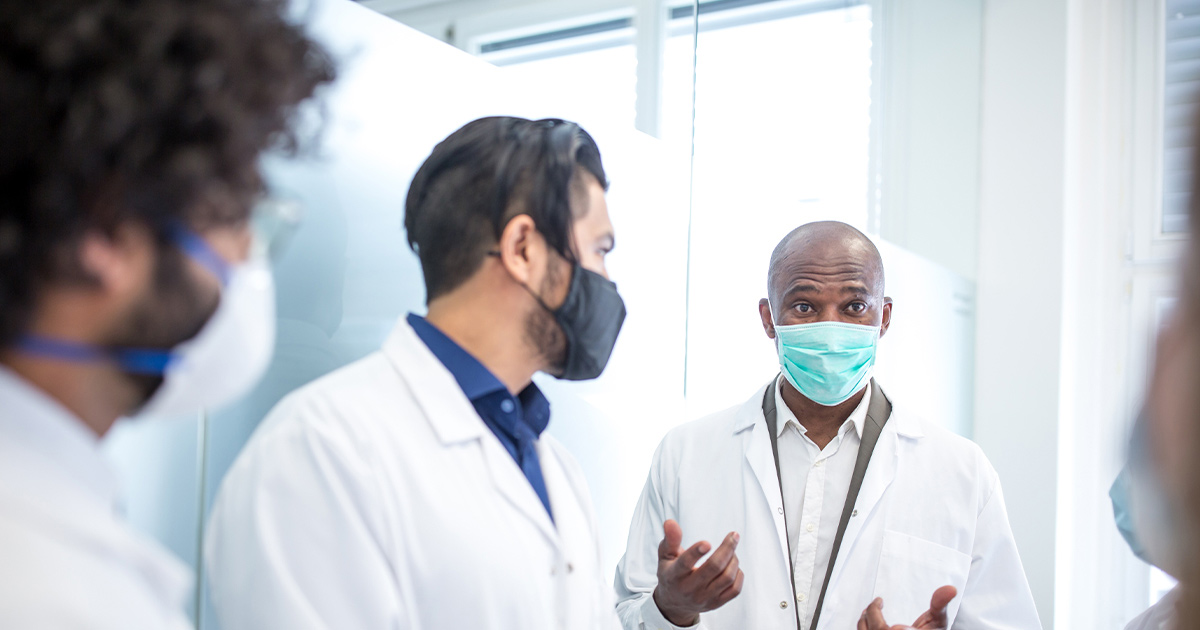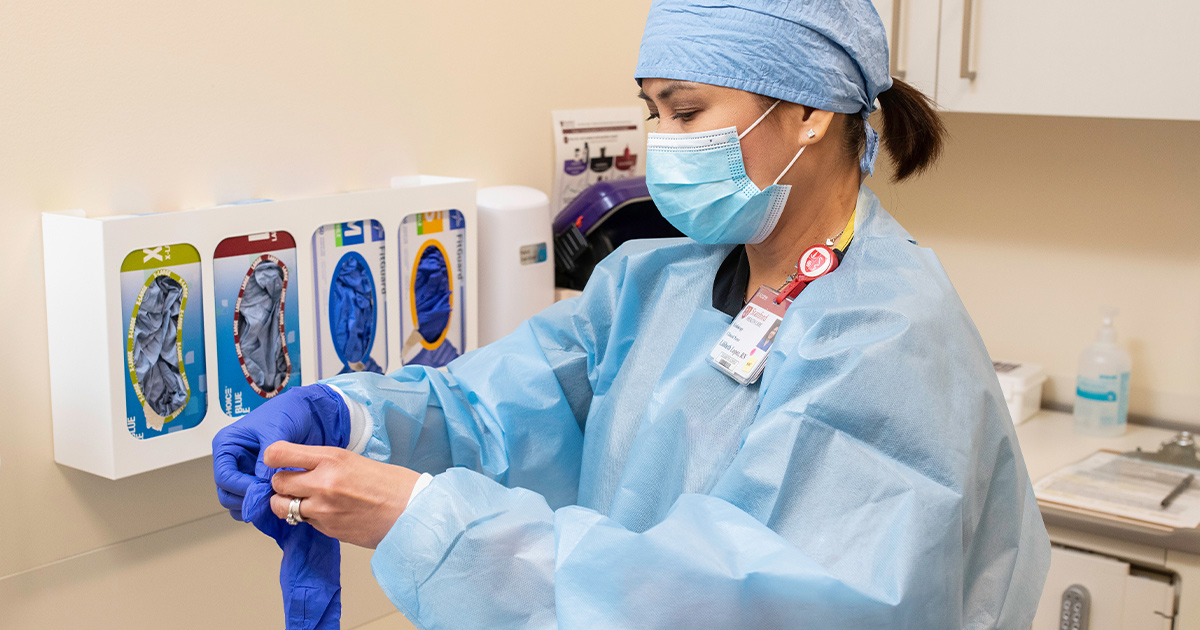Advanced Endoscopy
Part of Digestive Health Center

Leaders in Advanced Endoscopy Services
Our fellowship-trained advanced endoscopists expertly diagnose and treat complex gastrointestinal (GI) conditions, such as pancreatitis, large colon polyps, and Barrett’s esophagus.
Doctors nationwide refer patients with complicated conditions and anatomy to us for advanced endoscopic treatments. We have the tools to confirm a precise diagnosis and develop personalized care plans.
What We Offer You for Advanced Endoscopic Services
- Renowned interventional endoscopists, gastroenterologists with advanced training in treating serious disorders of the digestive tract, bile duct, and pancreas. Go to Conditions Treated
- Precise diagnostic services that go beyond the reach of traditional tools to pinpoint the exact cause of GI symptoms and ensure an on-target treatment plan. Go to Diagnostic Services
- Advanced treatment services, such as peroral endoscopic myotomy (POEM) and endoscopic submucosal dissection (ESD), for cancers and complicated GI problems. Go to Treatments
- Clinical trials offering opportunities to access innovative therapies before they are widely available. Go to Clinical Trials
- Team-based approach to care with specialists from the Digestive Health Center, including highly specialized gastroenterologists, hepatologists, and GI specialists. Go to Your Care Team
- Comprehensive support services to promote healing, including nurses and social workers who guide you through the treatment journey. Go to Support Services
- Ease of access with a convenient location at our main Stanford Health Care campus in Palo Alto. Go to Accessing Care
The advanced endoscopy experts at Stanford understand how disruptive digestive problems can be. Our interventional endoscopists are GI experts with advanced training in using specialized tools for even the most complex GI conditions.
Depending on your unique case, our doctors use endoscopes (flexible tubes with an attached light, camera, and special tools) that are longer and more maneuverable to diagnose and treat certain conditions. We use endoscopic ultrasounds to examine the digestive tract and surrounding tissues and organs for more details about your specific symptoms. We also offer endoscopic banding, clipping, and stenting, minimally invasive procedures that avoid surgery and help you have a faster, less painful recovery.
At Stanford, you have access to some of the nation’s leading endoscopy doctors. Our GI specialists conduct research and studies dedicated to improving the lives of people with complex GI disease.
We offer general endoscopy services in Palo Alto and Redwood City. Our advanced endoscopic services at Palo Alto help us view and treat harder-to-reach parts of the anatomy. We use advanced endoscopic procedures for these conditions:
Bile Duct
Esophagus
Pancreas
Precancerous
The liver produces bile, a digestive juice that breaks down fat and helps eliminate toxins and waste. Bile is stored in the gallbladder. Certain problems hinder the flow of bile.
- Bile duct cancer (cholangiocarcinoma)
- Bile duct stones (choledocholithiasis)
- Bile duct strictures, or blockage
The esophagus carries food and liquids to your stomach. Certain problems can interfere with swallowing or allow acidic stomach contents to leak back into the esophagus.
The pancreas produces hormones that help break down food and control blood sugar levels. Pancreatic problems include:
- Chronic pancreatitis
- Pancreatic cancer
- Pancreatic cysts and masses
- Pancreatic stones
Endoscopy procedures can detect problems before they have a chance to become cancerous. We also can detect cancers in the earliest stages when they are most treatable. Our interventional endoscopists diagnose and treat GI cancers and other conditions including:
- Barrett’s esophagus
- Gastric intestinal metaplasia
- Large colon polyps
- Pancreatic cancer screening
The liver produces bile, a digestive juice that breaks down fat and helps eliminate toxins and waste. Bile is stored in the gallbladder. Certain problems hinder the flow of bile.
- Bile duct cancer (cholangiocarcinoma)
- Bile duct stones (choledocholithiasis)
- Bile duct strictures, or blockage
close Bile Duct
The esophagus carries food and liquids to your stomach. Certain problems can interfere with swallowing or allow acidic stomach contents to leak back into the esophagus.
close Esophagus
The pancreas produces hormones that help break down food and control blood sugar levels. Pancreatic problems include:
- Chronic pancreatitis
- Pancreatic cancer
- Pancreatic cysts and masses
- Pancreatic stones
close Pancreas
Endoscopy procedures can detect problems before they have a chance to become cancerous. We also can detect cancers in the earliest stages when they are most treatable. Our interventional endoscopists diagnose and treat GI cancers and other conditions including:
- Barrett’s esophagus
- Gastric intestinal metaplasia
- Large colon polyps
- Pancreatic cancer screening
close Precancerous
Some digestive problems are challenging to diagnose and treat often because of complex anatomy. Our advanced endoscopists are experts at using specialized tools to maneuver and access hard-to-reach areas inside the body. Because of our high level of expertise, you have access to these procedures, which are available only at a select few medical centers nationwide.
INNOVATION HIGHLIGHTS
Our interventional endoscopists are pioneers in the field of minimally invasive end
- Stanford is one of the first centers in the country using Peroral endoscopic myotomy (POEM) to treat achalasia and other swallowing disorders.
- We are one of a handful of centers in the Bay Area offering the Stretta® procedure and transoral incisionless fundoplication (TIF).
Advanced Diagnostics
Our endoscopy experts use the latest diagnostic technology to pinpoint the true cause of your symptoms. This technology goes beyond the reach of traditional tools, providing our doctors access to areas that are often difficult to reach and treat. Our advanced diagnostic tests include:
Confocal microscopy
This procedure precisely identifies treatment areas before ablation therapy for esophageal disorders, such as dysplasia (abnormal cells) and Barrett’s esophagus. We also can check for dysplasia that comes back, thereby reducing biopsies.
Double-balloon enteroscopy
Tiny balloons attached to an endoscope apply gentle suction to intestine walls to bring difficult-to-reach sections closer to the camera. Find out what to expect during a double-balloon enteroscopy.
Endoscopic ultrasound (EUS)
High-frequency sound waves produce images of the esophagus and stomach lining. We also use EUS to take tissue samples, check for pancreatic cancer, administer pain blocks, and place markers for radiation treatments.
Optical coherence tomography (OCT)
Following ablation therapy, this special imaging tool checks for the recurrence of potentially cancerous lesions in the esophagus, stomach, bile duct, or pancreas.
Other endoscopic diagnostic tests available at Stanford include:
- Capsule endoscopy
- Colonoscopy
- Esophageal manometry
- Small bowel manometry
- Sigmoidoscopy
- Upper GI endoscopy
- Virtual colonoscopy
Treatments
Our well-regarded interventional endoscopy doctors have undergone extensive training in complex minimally invasive treatments. In our dedicated endoscopy suites, we offer treatments not widely available elsewhere on the West Coast.
Endoscopic retrograde cholangiopancreatography (ERCP)
Dye enters bile ducts while X-rays are taken. ERCP checks for blockages in the liver, gallbladder, bile ducts, and pancreas. Your doctor also can remove obstructions or take tissue samples. Find out what to expect during ERCP.
Endoscopic mucosal resection (EMR)
Your doctor removes precancerous growths from the GI tract, such as the esophagus, stomach, rectum, or small or large intestine. EMR treats:
Endoscopic submucosal dissection (ESD)
Instead of surgically removing portions of a diseased esophagus or stomach (resection), our doctors use endoscopic techniques to remove tumors from deep within the GI tract. With this minimally invasive procedure, you are likely to have a faster recovery with less pain. ESD treats:
- Barrett’s esophagus
- Benign esophageal tumors
- Esophageal cancer
- Gastric intestinal metaplasia
- Large colon polyps
- Stomach cancer
Endoscopic fistula closure
We use endoscopy to close fistulas, openings between organs or tissues. Via the Inflammatory Bowel Disease Program, we offer a range of minimally invasive fistula repair procedures.
Peroral endoscopic myotomy (POEM)
We’re national leaders in using POEM for swallowing disorders. POEM uses a series of small incisions to permanently relax esophageal muscles. We provide this groundbreaking procedure with the Esophagus Center.
Stretta® procedure
This GERD treatment uses low-frequency energy to tighten the ring of muscles in the lower esophagus, or sphincter. Stanford was among the first in the country to offer Stretta.
Transoral incisionless fundoplication (TIF)
Stanford doctors are among the first to offer TIF, a nonsurgical alternative to the Nissen fundoplication for GERD. An endoscopic device creates a seal between the stomach and esophagus.
Clinical Trials
Clinical trials evaluate new approaches, devices, or medications in the treatment of gliomas. We have a robust clinical trial program aimed at improving diagnosis and treatment of digestive disorders. These research studies evaluate novel medical approaches, devices, medications, and other treatments.
Ask your doctor or clinical trials coordinator about available trials that may be additional options for your care.
Your Care Team
At Stanford, we bring together experts on your care team who have deep expertise in treating your specific condition. We understand that digestive problems affect everyone differently. We listen to your concerns to provide you with the most appropriate care.

Your Doctors
Interventional Endoscopists
Our endoscopists are gastroenterologists that have advanced specialized training in complex endoscopy procedures, such as POEM, endoscopic submucosal dissection, and double-balloon enteroscopy.
View All {0} Endoscopic Ultrasound SpecialistsGastroenterologists
Gastroenterologists diagnose, manage, and treat a range of digestive disorders, from the common to the complex.
View All {0} GastroenterologistsHepatologist
Our liver specialists, or hepatologists, care for people who have liver disease, liver failure, or cirrhosis. Upper endoscopic procedures help screen for submucosal veins, or varices, in the esophagus or stomach.
View All {0} HepatologistsTransplant Hepatologists
Transplant hepatologists specialize in treating people who have advanced liver disease, including those who need liver transplants. Colonoscopy helps screen for colon cancer and determine liver transplant eligibility.
View All {0} Liver Transplantation SpecialistsInterventional Radiologist
Our Interventional Radiologists specialize in minimally invasive, targeted treatments. We offer in-depth knowledge of radiological treatments available coupled with diagnostic and clinical experience.
View All {0} Interventional RadiologistsStanford is an Academic Medical Center, which is a type of hospital setting where doctors teach the entire spectrum of medical education. Students range from beginning medical students to fully licensed and practicing doctors completing advanced sub-specialty training. Stanford Medicine is a partnership between Stanford University School of Medicine and Stanford Health Care. Since Stanford is a teaching hospital, you can expect to meet many providers and providers in training.
- Attending Physician: a doctor who supervises doctors in training or in medical school
- Fellow: a doctor doing postgraduate level work and specializing in care of patients with specific conditions
- Resident: a doctor who has graduated from medical school and is in training (also called “residency”) here at Stanford. A resident is also called an intern
- Medical Student: a student who is currently enrolled in medical school with the goal of becoming a doctor

Extended Care Team
Endoscopy nurses assist doctors during endoscopic procedures. These nurses also monitor you before, during, and after an endoscopic procedure.
Our food and nutrition experts help you make healthy diet changes to reduce or prevent GI symptoms.
Our patient care coordinator assists with scheduling appointments with specialists and labs. This coordinator also provides guidance throughout your medical journey.
Interpreter Services offer free medical interpretation and translation for patients and physicians. Services include in-person and telephone interpretation, as well as video conferences.

Support Services
To help guide you through the diagnostic and treatment process, we offer a variety of support services.
Accessing Care
The Endoscopy Suites in Palo Alto offer the highest level of endoscopy care, including specialized procedures available only at a handful of medical centers on the West Coast. For your convenience, we also offer endoscopy services at our Digestive Health Center in Redwood City.
Frequently Asked Questions
We participate in a wide range of insurance plans. View the list of insurance plans accepted by Stanford Health Care
Have insurance or pre-authorization questions? The Patient Financial Clearance team is available Monday – Friday, 8 a.m. – 5 p.m., to answer your questions. Please call 650-724-4445 or 1-877-291-7335 (toll free).
At Stanford, we take care of the details so that you can focus on your health and wellness. Our gastroenterologists work as a team with device nurses, advanced practice providers, registered dietitians, and imaging technologists to coordinate every aspect of your care.
Your comfort and convenience are our top priority, which is why we listened to our patients when designing our endoscopy suites. Learn more about our services amenities
You will need a doctor to order the services for the Advanced Endoscopy Clinic. If you need a referral, please call 650-736-5555 to start the referral process.
Yes, Stanford Health Care offers financial assistance for patients who are uninsured or underinsured. Meet with one of our financial counselors to find the best approach to paying for your health care. Financial counselors are available Monday through Friday from 7:00 a.m. – 6:00 p.m. Learn more about financial assistance services
Our care team guides you every step of the way for your procedure, including:
- What to expect and what to bring on the day of your appointment
- Maps, directions, parking, public transit options, and contact information
- Suggested questions to ask your doctor
For your first appointment, you should plan to bring any related test results and your medical history to share with your doctor. Our clinic receptionists will confirm the information you should bring with you prior to your first appointment.
You will also need to have the following information with you when you check in:
- Insurance card
- A form of payment for any co-pays or deductibles
- One form of photo ID:
- Valid state-issued driver’s license
- Valid state-issued ID card
- Valid passport
- Valid U.S. Military ID card
- Valid U.S. Permanent Resident Card
The Advanced Endoscopy Clinic is located at the following address. Valet and self-parking options are available for a fee.
Directions and Parking information for the Advanced Endoscopy Program:
Advanced Endoscopy Program
300 Pasteur Drive
Ground Floor
Phone: 650-736-5555
Please plan to arrive 20-30 minutes prior to your appointment time due to construction near Stanford Hospital. This will allow you plenty of time to park, locate your clinic and complete any additional paperwork.
Please print, fill out, and return the Medical Record Release Form to your new patient coordinator. The medical release form is an authorization form for external facilities to release medical records to Stanford Health Care.
Always feel free to bring someone with you to your appointments. A family member or friend can help ask questions, remember the information your care team gives you, and provide support.
Also, due to the effects of anesthesia, some endoscopic procedures require someone else to drive you home. Please talk to the clinic for details.
Write down your questions before your appointment and rank them in order of importance, beginning with the most important ones. If there isn’t enough time to have all your questions answered during your appointment, ask your doctor who you can speak with to get your other questions answered.
You have multiple options when it comes to paying your bill.
- Pay Online:
- You can log in to MyHealth or the MyHealth mobile app to see and pay your bill.
Already have an account but need help logging in?
Contact the MyHealth Help Desk
- You can also pay as a guest to pay your bill without logging in.
- Pay by mail:
- Stanford Health Care
P.O. Box 740715, Los Angeles, CA 90074-0715
Los Angeles, CA 90074-0715
- Stanford Health Care
- Pay by Phone:
- You can call our Patient Billing Customer Service Office
1-800-549-3720.
- You can call our Patient Billing Customer Service Office
For our latest business hours and for more information about billing, visit our Billing page.
At Stanford, we take care of the details so that you can focus on your health and wellness. Our gastroenterologists work as a team with device nurses, advanced practice providers, registered dietitians, and imaging technologists to coordinate every aspect of your care.
Your comfort and convenience are our top priority, which is why we listened to our patients when designing our endoscopy suites. Learn more about our services amenities
Please call our clinic receptionists at 650-736-5555. They are available Monday through Friday, 8:30 a.m. to 5:30 p.m. to help you reschedule or cancel your appointment.
Many of our programs are available to international patients.
Our International Medicine Services team can help you find the right doctor, estimate medical costs, book travel, and get you information about Stanford programs and services.
Please call +1 650-723-8561 or email IMS@stanfordhealthcare.org to get started.
For Referring Physicians
PHYSICIAN HELPLINE
Fax: 650-320-9443
Monday–Friday, 8 a.m.–5 p.m.
Stanford Health Care provides comprehensive services to refer and track patients, as well as the latest information and news for physicians and office staff. For help with all referral needs and questions, visit Referral Information.
You may also submit a web referral or complete a referral form and fax it to 650-320-9443 or email the Referral Center at ReferralCenter@stanfordhealthcare.org.


